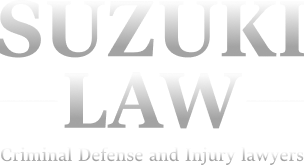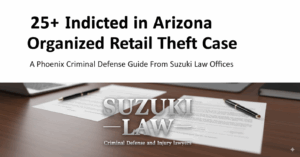If you’re facing charges after over 25 people were indicted in Arizona for organized retail theft, it’s essential to understand the charges, including ORT, Fraudulent Schemes, and Enterprise crimes. Prosecutors use digital evidence, seized merchandise, and financial records to build cases. Penalties can be severe, and the legal process is intricate. Contacting investigators or receiving a subpoena requires swift action. Staying informed can help you protect your rights and build a strong defense—if you continue, you’ll learn more. For expert legal guidance, consider consulting a Phoenix Criminal Defense Lawyer.
What the AG’s Organized Retail Theft indictments mean for Phoenix defendants
The AG’s recent indictments of the iSold It ring in Glendale send a clear message to anyone involved in retail theft or related crimes in Phoenix: law enforcement is intensifying its efforts to target and dismantle these criminal enterprises.
If you face allegations of organized retail theft charges, understanding the Arizona grand jury indictment process is essential. These indictments show that authorities are taking a firm stance on large-scale theft operations, especially those involving trafficking stolen property and conspiracy.
Understanding Arizona grand jury indictments is key for defending organized retail theft charges effectively.
As a defendant, you need effective defense strategies for retail theft investigations to protect your rights. A skilled Phoenix criminal defense lawyer can challenge prosecutors’ evidence, reveal procedural errors, and develop a tailored defense plan.
Being proactive in your defense can make a difference in the outcome of your case, especially with serious allegations like these. The recent indictments underscore the importance of experienced legal representation in handling complex retail theft cases.
Committed to providing exceptional legal service to each and every client through integrity, compassion and experience.
Get StartedCharges at a glance: ORT (A.R.S. 13-1819), Fraudulent Schemes (A.R.S. 13-2310), and Enterprise crimes (A.R.S. 13-2312)
Understanding your charges is crucial when facing accusations of retail theft in Arizona. You’ll want to know what ORT, Fraudulent Schemes, and Enterprise crimes entail and how they impact your legal situation.
Let’s examine the essential charges and their potential consequences.
Key Charges Overview
Several pivotal charges shape the indictment against iSold It and its associates, including organized retail theft charges (A.R.S. 13-1819), trafficking in stolen property in Arizona, Fraudulent Schemes (A.R.S. 13-2310), and Enterprise Crimes (A.R.S. 13-2312).
These charges reflect the defendants’ alleged scheme to buy stolen media, mainly DVDs and Blu-rays, and resell them at discounts.
You could face serious consequences if convicted of conspiracy in ORT prosecutions, which involve coordinated efforts to commit theft and trafficking offenses.
The fraudulent schemes and artifices charge addresses the use of deception to profit from stolen property.
Understanding these vital charges is critical, as they significantly impact your legal defense strategy and potential penalties in this intricate case.
Legal Consequences Explained
Falling under serious criminal categories, the charges you’re facing—such as Organized Retail Theft (A.R.S. 13-1819), Fraudulent Schemes (A.R.S. 13-2310), and Enterprise Crimes (A.R.S. 13-2312)—carry significant legal consequences. If convicted, you could face hefty fines, lengthy prison sentences, and extended probation.
Here’s what you should know:
- Your organized retail theft charges may result in felony convictions, especially if linked to trafficking in stolen property or involving a substantial value.
- Allegations of fraudulent schemes and artifices a.r.s can establish conspiracy and intent in ort prosecutions, increasing the severity of penalties.
- Convictions for enterprise crimes often result in felony sentences, reflecting the seriousness of operating an enterprise illegally, which is usually involved in theft and fraud.
From Glendale to Phoenix: how statewide investigations and grand juries work
Statewide investigations and grand juries in Arizona operate across multiple jurisdictions to uncover complex criminal schemes, such as organized retail theft.
When authorities suspect crimes such as trafficking in stolen property, Phoenix, or other elaborate theft rings, they coordinate efforts through grand jury investigations in Arizona. These investigations often involve digital forensics search warrants, which help gather essential electronic evidence, like online transactions or communications related to stolen goods.
Once enough evidence accumulates, a grand jury reviews the case and can issue indictments for crimes, such as organized retail theft charges. This process helps unify local law enforcement agencies’ efforts to combat large-scale theft operations, ensuring suspects face accountability regardless of where they’re apprehended.
Statewide investigations and grand juries are vital tools in tackling crimes that span multiple jurisdictions, enabling prosecutors to build thorough cases against sophisticated theft rings, like the one involving iSold It on eBay.
Click to contact our personal injury lawyers today
Evidence prosecutors use in fencing cases: online storefronts, financials, and seized merchandise
Prosecutors often use online storefront evidence to connect suspects to stolen property, demonstrating how they advertised and sold items such as DVDs and Blu-rays.
Financial documents help reveal suspicious transactions and profits from illicit activities, such as money laundering and drug trafficking.
Seized merchandise provides direct proof of stolen goods, linking defendants to illegal sales.
Online Storefront Evidence
How do investigators link online storefronts to illegal activity in fencing cases? They use digital forensics and search warrants to trace online sales, connecting them to stolen property.
This involves collecting evidence from online storefronts, analyzing transaction records, and matching items sold to theft reports.
Here are three pivotal steps:
- Conduct search warrants in Arizona at storage facilities, servers, or storefront accounts to seize evidence.
- Review online sales data, messaging, and transaction histories to identify illicit sales of stolen goods.
- Link seized merchandise or digital footprints to individuals involved in organized retail theft charges or trafficking in stolen property in Phoenix cases.
This process strengthens prosecutors’ cases and helps establish a clear pattern of illegal fencing activities.
Financial Documentation Review
Financial documentation plays a crucial role in building a case against individuals involved in retail theft and fencing operations.
During a financial documentation review, prosecutors examine transaction records, bank statements, and sales data to connect online storefronts and seized assets to criminal activity. These documents can reveal patterns of trafficking in stolen property and demonstrate how defendants profit from operating an illegal enterprise.
For example, discrepancies between purchase costs and sale prices can indicate the sale of stolen goods. Keeping detailed financial records or presenting forged or altered documents can be used as evidence to support organized retail theft charges.
Understanding how prosecutors utilize financial documentation is crucial for building a defense and effectively challenging their case. Proper legal guidance ensures you’re prepared for the implications of economic evidence in your defense.
Seized Merchandise Analysis
Seized merchandise, including electronics, media, and other stolen goods, serves as essential physical evidence in fencing cases. It helps prove trafficking stolen property and organized retail theft.
When authorities confiscate items, they analyze their connection to the defendants’ online storefronts, such as iSold It’s Amazon shop. You should note that:
- The value of seized merchandise often surpasses felony theft thresholds, which influences charges.
- Evidence linking seized goods to known stolen property can bolster prosecution claims.
- Proper cataloging of seized merchandise clarifies its role in organized retail theft schemes and trafficking activities.
Understanding this analysis helps you evaluate your case and identify potential weaknesses or defenses related to the possession and sale of stolen goods.
Complete a Free Case Evaluation form now
Valuation thresholds, aggregation over years, and why dollar amounts matter in Arizona
In Arizona, the monetary thresholds that define the severity of retail theft offenses are essential because they determine whether a case is charged as a misdemeanor or a felony. Specifically, felony theft thresholds are set based on the value of the stolen property, with amounts exceeding $1,000 often leading to charges for organized retail theft. When the valuation thresholds are met or exceeded, charges escalate, which can sometimes result in serious consequences.
It’s imperative to understand that trafficking in stolen property and aggregating theft values over multiple years can considerably increase the dollar amount involved. This cumulative approach can trigger felony classification even if individual thefts fall below the threshold.
The dollar amounts you face matter because they directly influence the severity of the charges and potential penalties. Being aware of these thresholds and how they apply over time helps you understand the stakes in retail theft cases and why prosecutors focus on dollar amounts in Arizona.
Intent, conspiracy, and the role of alleged “boosters”: what the State must prove
When prosecutors charge retail theft and related crimes, they must show that you intentionally committed the acts or conspired with others to do so.
Establishing a defendant’s connection to a scheme involves proving they knowingly participated in or planned the illegal activity.
Understanding how the State links alleged “boosters” and others to the crime is crucial to grasping what they need to prove in court.
Proving Criminal Intent
To prove criminal intent in cases involving organized retail theft charges and conspiracy, the prosecution must demonstrate that you knowingly engaged in illegal activities with the intent to commit theft or fraud. They need to show that you intentionally participated in trafficking in stolen property, or devised fraudulent schemes and artifices under A.R.S. 13-2310.
Specifically, the State must establish that you aimed to conduct an enterprise A.R.S. illegally and knew the property was stolen.
Key elements include:
- Evidence of deliberate involvement in trafficking stolen items, like DVDs or Blu-rays.
- Proof that you coordinated with coconspirators or “boosters.”
- Demonstration of awareness that your actions supported organized retail theft and related schemes.
Establishing Conspiracy Links
Establishing links of conspiracy requires proving that all involved knowingly participated in a coordinated effort to commit retail theft and related crimes.
In Arizona retail cases, the state must demonstrate that each defendant, including alleged “boosters,” collaborated intentionally to engage in trafficking in stolen property and organized retail theft charges.
You need to show their active role in planning, facilitating, or executing the scheme.
The prosecution focuses on proving the shared understanding and agreement to commit these crimes, not just individual acts.
This can involve evidence of communications, financial transactions, or coordinated purchasing behavior.
Understanding how the conspiracy is structured and the role each participant plays is crucial in defending against organized retail theft charges and challenging the extent of the alleged conspiracy.
Search warrants, digital forensics, and chain of custody: common defense challenges
Search warrants and digital forensics play a critical role in retail theft cases, but they also present significant challenges for the defense. When authorities execute search warrants, they must verify procedures follow legal standards to avoid evidence exclusion.
Digital forensics involves recovering and analyzing electronic data, which can be intricate due to encryption or data manipulation.
Digital forensics requires careful recovery and analysis of electronic data despite encryption and potential manipulation challenges.
If the chain of custody isn’t correctly maintained, evidence may be compromised or questioned in court, weakening your case against organized retail theft charges.
Key defense challenges include:
- Verifying warrants were adequately supported and executed to prevent evidence from being inadmissible.
- Ensuring the integrity of digital forensics, including proper handling and accurate analysis of electronic evidence.
- Maintaining an unbroken chain of custody to establish the evidence’s authenticity and prevent claims of tampering or contamination.
Understanding these challenges helps you grasp how technical and procedural issues can impact your defense strategy.
Potential penalties and collateral consequences in ORT and enterprise cases
If you’re facing organized retail theft or enterprise charges, understanding the potential penalties and collateral impacts is essential.
You could face significant criminal penalties and substantial fines that may impact your future opportunities. These charges may also lead to long-term legal consequences that extend beyond the courtroom.
Criminal Sentences and Fines
When convicted of organized retail theft charges or engaging in an enterprise related to the sale of stolen property, you face severe criminal sentences and fines.
Arizona’s felony theft thresholds mean penalties escalate with the severity of the offense. If you’re caught trafficking in stolen property in Phoenix, the consequences become even harsher.
Typically, potential penalties include:
- Prison time possibly ranging from one year to multiple decades, based on the charges.
- Heavy fines that can reach tens of thousands of dollars.
- Collateral consequences, such as a permanent criminal record, impact on employment, and restrictions on future licensing, can be severe.
Understanding the potential for long-term consequences is vital for anyone facing or charged with an organized retail theft case.
Long-term Legal Effects
Engaging in organized retail theft or operating an enterprise involved in stolen property can have severe long-term legal consequences. If you’re convicted of organized retail theft charges or trafficking in stolen property in Phoenix, the penalties extend beyond fines and jail time.
You could face extended probation, restitution payments, and mandatory community service. Convictions for illegally conducting an enterprise may result in fines, asset forfeiture, and the loss of business licenses.
These long-term legal effects can impact your employment, reputation, and future financial stability. Furthermore, being involved in such cases often results in a permanent criminal record, which can make it more difficult to find housing or secure employment.
Protecting your rights with experienced legal counsel is essential if you’re facing these serious charges.
If investigators contact you or you receive a subpoena: first steps to protect your rights
Receiving a call or subpoena from investigators can be intimidating, but taking immediate steps to protect your rights is vital. A subpoena is a legal document demanding your presence or records, and it’s paramount to handle it properly to avoid unintended consequences in your criminal defense or Arizona organized retail theft charges.
Here are your first steps:
- Remain calm and don’t ignore the subpoena. Contact an experienced criminal defense attorney promptly to understand your legal rights and options.
- Review the subpoena carefully—note what it requests and deadlines for compliance. Never provide information or documents without legal guidance.
- Don’t discuss the case or make statements to investigators without your lawyer present. Anything said could be used against you, so protect your constitutional rights immediately.
Taking these steps ensures you manage the situation effectively and preserve your legal rights during this vital phase.
Defense strategies Suzuki Law Offices uses in Phoenix ORT, fraud, and enterprise prosecutions
When facing serious charges, such as retail theft or enterprise crimes, you need a strong defense.
Suzuki Law Offices expertly challenges evidence collection and uses legal precedents to build your case.
They also negotiate for plea deals when appropriate to protect your rights and interests.
Evidence Challenges and Collection
In complex ORT, fraud, and enterprise cases, such as those handled by Suzuki Law Offices in Phoenix, the defense team faces significant challenges in gathering and scrutinizing evidence.
Prosecutors often rely on intricate digital records, surveillance footage, and confiscated assets, making evidence collection a complex process. To contest organized retail theft charges or trafficking in stolen property in Phoenix, you need strategic scrutiny.
Here are three pivotal tactics we use:
- Challenging the legality of evidence collection methods to prevent illegally obtained evidence from being admitted.
- Examining digital and financial records for inconsistencies or tampering.
- Identifying gaps in surveillance or physical evidence that weaken the prosecution’s case against illegal enterprise conduct.
These strategies help safeguard your rights against flawed evidence collection efforts.
Legal Precedents and Strategies
Suzuki Law Offices employs a range of legal precedents and strategic defenses to counter organized retail theft charges, trafficking in stolen property, and illegally conducting an enterprise in Phoenix.
We focus on challenging the prosecution’s evidence, such as demonstrating a lack of direct links between the accused and the stolen merchandise.
Our strategies include highlighting procedural errors, establishing a lack of intent, and emphasizing the distinction between possession and participation.
When confronting a retail theft ring indictment, we aim to undermine the credibility of forensic evidence or witness testimony.
We also explore avenues to argue that the defendants were not actively involved in managing or controlling the enterprise.
These tactics are integral in building a strong defense against sophisticated charges involving organized retail theft and related enterprise crimes.
Negotiation and Plea Bargains
Are negotiations and plea bargains an effective way to resolve complex retail theft, fraud, or enterprise cases? Absolutely. They can help reduce charges like organized retail theft or trafficking in stolen property Phoenix.
For example, negotiating can lead to lesser charges if the evidence against you is strong. If you’re accused of illegally conducting an enterprise, a strategic plea bargain might result in reduced sentencing or alternative penalties.
- You can achieve a more favorable outcome by negotiating on pivotal charges.
- Plea deals can limit the potential jail time that may be involved.
- Skilled negotiation may help you avoid a conviction on the most serious charges.
Why choose Suzuki Law Offices: local experience, rapid response, and 24/7 consultations
Choosing Suzuki Law Offices means benefiting from proven local experience, ensuring you get knowledgeable guidance tailored to Arizona’s legal landscape.
If you’re facing organized retail theft charges, trafficking in stolen property in Phoenix, or allegations of illegally conducting an enterprise, you need a firm that comprehends these intricate cases.
With years of experience in criminal defense in Phoenix, we’re prepared to develop strategic defenses and negotiate effectively.
Our team responds promptly to your urgent needs, providing expert advice from the moment you contact us.
We understand the stakes involved in retail theft and related crimes, and we’re available 24/7 for consultations, so you’re never left waiting.
From the initial arrest to courtroom representation, your case receives personalized attention from attorneys who are well-versed in Arizona’s laws.
When charges threaten your future, trust Suzuki Law Offices for dedicated, responsive, and experienced legal support—your best defense against serious criminal accusations.
Conclusion
If you’re facing charges related to organized retail theft in Arizona, it’s essential to act quickly. The team at Suzuki Law Offices understands the intricacies of these cases and is here to protect your rights. With our local experience and dedicated approach, we’ll help you navigate the legal process and work toward the best possible outcome. Don’t wait—reach out today for a free consultation and get the support you need to defend your future. For expert legal guidance, visit our Phoenix Criminal Defense Lawyer.
Call or text (602) 682-5270 or complete a Free Case Evaluation form




